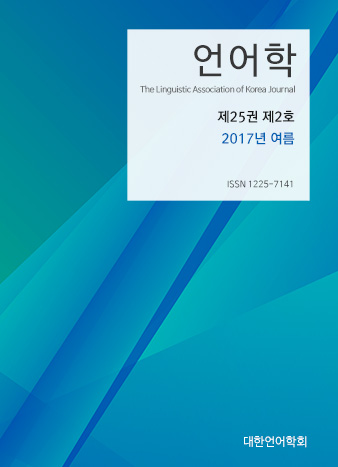대한언어학회 전자저널
25권 2호 (2017년 6월)
- Implicatures of the adjective chakhata
-
조윤경 & 최영주
Pages : 43-60
Abstract
Joh, Yoon-kyoung & Choi, Youngju. (2017). Implicatures of the adjective chakhata. The Linguistic Association of Korea Journal, 25(2), 43-60. Over two decades, the meaning of the adjective chakhata has been extended to the extent that it is compatible with inanimate objects, which was not imaginable before 1990. The phenomenon attracted many researchers' attention including Kim (2009), Cho (2012), Kim (2012, 2013) and Lim (2014). Their main contribution is the identification and categorization of the new nominal collocates of chakhata. They also reveal that the original meaning of chakhata, good has extended to various meanings through metaphor. In doing so, Lim (2014) observes two more meanings than previous researchers, which are superior or great and not excellent or not great. He deals with them as basic meanings, along with the other meanings. However, we claim that the two meanings come from implicatures. The purpose of the paper is to show how an implicature-based account is better suited for strongly positive and negative meanings of the scalar words such as chakhata. (Mokpo National University and Chosun University).
Keywords
# denotation # Q-implicatures # R-implicatures # metonymy # semantic extension
References
- 김명광. (2009). 형용사 ‘착하-’의 구조 변화에 대한 일고찰. 언어와 문화, 5(3), 117-137.
- 김철규. (2012). 한국어 형용사 ‘착한’의 연어에 관한 단기 통시적 고찰. 언어과학, 19(4), 65-87.
- 조항범. (2012). 현대국어의 의미 변화에 대하여(2): 형용사, 동사를 중심으로. 한국언어문학, 81(1), 85-112.
- Blome-Tillmann, M. (2008). Conversational implicature and the cancellability test. Analysis, 68(2), 156-160.
- Carston, R. (1998). Informativeness, relevance and scalar implicature. In R. Carston & S. Uchida (Eds.), Relevance theory: Applications and implications (pp. 179-236). Amsterdam: John Benjamins.
- Gawron, J. M. (2016). Q and R principles: Lecture note of San Diego State University. Retrieved January 12, 2016, from http://www.rohan.sdsu.edu/~gawron.
- Grice, P. (1975). Logic and conversation. In P. Cole & J. Morgan (Eds.), Syntax and semantics 3: Speech acts (pp. 41-58). New York: Academic Press.
- Horn, L. (1985). Metalinguistic negation and pragmatic ambiguity. Language, 61(1), 121-174.
- Kim, C. (2013). The metaphorical meanings of the Korean adjective chakhan in Korean newspapers from 1990 to 2011. Discourse and Cognition, 20(3), 89-109.
- Lim, J. (2014). Aspects of semantic extension of 'chakhata' and its senses. Korean Journal of Linguistics, 39(4), 971-996.
- Matsumoto, Y. (1995). The conversational condition on Horn scales. Linguistics and Philosophy, 18(1), 21-60.
- Voβhagen, C. (1999). Opposition as a metonymic principle. In K. Panther & G. Radden (Eds.), Metonymy in language and thought (pp. 289-308). Philadelphia, PA: John Benjamins Publishing Company.
